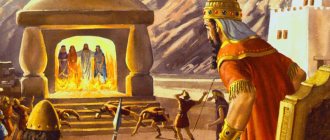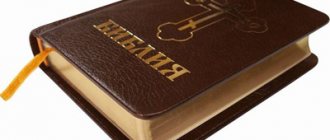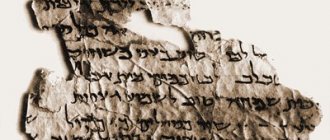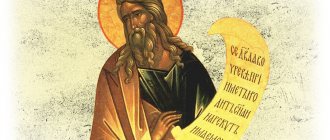SERVICE BOOKS are either liturgical texts used during worship, or instructions on how these texts should be used.
The texts of liturgical books are divided into the main part, which contains the unchangeable charter of liturgical books, and the variable part with prayers that change in accordance with the holiday or day of the calendar. The unchangeable elements are contained in the Euchologia, or Service Book, and in the Book of Hours, the book of services for the daily cycle. The prayers of the moving, changing cycle are found in the Lenten Triodion, the Colored Triodion and the Octoechos. A fixed cycle of prayers for the remembrance of saints, the days of celebration of which are distributed over all days of the calendar year, is contained in the twelve-volume Menaion. Reading passages from the New Testament are used in both cycles and are collected in two books: the Apostle and the Gospel. The Typikon is a code, a charter that regulates the use of liturgical books in accordance with the holidays of the church year. It is extremely difficult to present the changeable and unchangeable parts in one book so that each church service is contained in its entirety, because the service changes daily in some of its parts in accordance with the moving holidays. To present all the services of one year would require hundreds of volumes. It is in connection with this circumstance that the division of liturgical books described above was undertaken. Also on topic:
RUSSIAN ORTHODOX CHURCH
All liturgical books of the Orthodox Church are of ancient origin. Information about them is already available in the works of the 3rd century that have reached us. Basically, the creation of liturgical books was completed by the 9th century, but their addition with new works of liturgical poetry and editing continued throughout the history of the church. The author who compiled the first Book of Hours is considered to be the Venerable Savva the Sanctified (6th century). Later, it included chants attributed by tradition to John of Damascus (8th century) and Theodore the Studite (9th century). The compiler of the Octoechos was also John of Damascus. The first combination of services into menaion collections is associated with the names of Sophronius, Patriarch of Jerusalem, and John of Damascus, and the compilation of the Triodeum is associated with the names of Joseph and Theodore the Studites. See also PRAYER.
Missal and Book of Hours
The Service Book and the Book of Hours contain texts of public worship, which are read and sung constantly or more often than others. These are the prayers of Vespers, Compline, Midnight Office, Matins, Liturgy and Hours. The services of Vespers and Matins are set out in them in full, with the difference that in the Service Book there are prayers said by the priest and deacon, and in the Book of Hours - by the reader and singers. The unchangeable prayers of the liturgy are contained only in the Service Book, and the unchangeable prayers of the Hours, Compline and Midnight Office are contained in the Book of Hours. See also LITURGY.
Liturgical aids
Even later, including in our time, various new books and manuals are compiled that are actively used in Orthodox worship, but do not have the status of canonical liturgical books, for example:
- Liturgical instructions;
- Orthodox calendar;
- Orthodox Liturgical Collection;
- The use of church singing;
- “Services of the first week of Great Lent”;
- "Services of Holy Week";
- “The Great Canon of Andrei of Crete. Mariino Standing. Twelve Passion Gospels";
- “The Rite of Passion with the Akathist of the Divine Passion of Christ”
- “Followment in the Holy and Great Week of Easter”;
- "Day of the Holy Trinity. Great Vespers, Matins, Liturgy, Vespers of Prayer for the Kneeling (in Church Slavonic)";
- “Service for the Dormition of the Blessed Virgin Mary. Funeral rite";
- and others.
Missal
Also on topic:
ORTHODOX SERVICE
The missal contains the texts of three liturgies, the celebration of which is customary in the Orthodox Church: the liturgy of John Chrysostom, the liturgy of Basil the Great and the liturgy of the Presanctified Gifts. An additional part of the Service Book contains prayers read at daily services, for example, the rite of litia for the dead, performed after Vespers and Matins, or prayers after communion. For ease of use, the book contains short, variable prayers, which are said by the priest and deacon at Vespers, Matins and Liturgy. Since at the end of the liturgy it is customary to remember the saints whose memory is celebrated on the day of the service, the Monthly Book of Saints is also printed in the Service Book - an index of the days of their memory.
Sacred and liturgical books
These are books from the Holy Scriptures of the Old and New Testaments, specially adapted for liturgical use:
- The Gospel is the most revered book in the Church. In terms of format, the liturgical Gospel is either altar or required;
- Apostle (book). The liturgical Gospel and the Apostle, in addition to dividing into ordinary chapters and verses, are also divided into special sections called “conceptions”, the numbers of which, in accordance with the celebration of the upcoming days of Easter, the month of the month, various faces of saints and for private services, are placed in the appendices of both of these books , with detailed indexes also: prokeimnov, alleluia, sacramental and liturgical antiphons to them;
- Psalter. Currently, the so-called Small Psalter , all psalms of which are grouped into 20 kathismas, is actively used in worship. In the Russian and some other Slavic Orthodox local churches there is a fairly voluminous Followed Psalter , which consists of five parts: 1) Small Psalter, 2) Book of Hours, 3) Book of Months, 4) Canon, 5) Seven. However, the majority of psalm-readers (often women) in parish choirs prefer to use more compact books and manuals. Thanks to the special love of Christians for the Psalter, this is the only book of the Old Testament, Which, in its unchanged form, has become the most important liturgical book of Christians, excerpts from Which are repeatedly used by them every day in their services;
- Unused Scrolls of the Old Testament. The first Christians were Jews, who for some time continued to punctually observe all the prescriptions of the Old Testament religion, including reading and careful study of all the Holy books of the Old Testament. The sacred texts of the Old Testament traditionally continued to be written on rolled scrolls (the books of the New Testament were immediately written on more convenient bound codices, similar to modern books). The number of scrolls was large (they were made small so that when rewinding them they were less torn). All books of the Old Testament were read in order over 3.5 years (half of the seven-year “Saturday Cycle”), but the most important (with prophecies about the Savior) passages were often repeated, especially on the occasion of certain Christian holidays. Initially, the authority of the Old Testament books was even higher than the New Testament epistles (Col. 4:16) and the Gospels (due to the many unverified heretical apocrypha that appeared). With the increase in the number of purely Christian prayers, chants and teachings, the time for reading the Old Testament was reduced, from which only the most valuable passages began to be selected - paremias, which were later included in the Menaion and Triodion. All these proverbs, with the additions of various prayers and teachings, were collected in a separate book - Parimeinik, but it was not distributed.
Book of Hours
The Book of Hours contains the texts of the Midnight Office, the Hours, the Fine Rite and Compline. The additional part of the Book of Hours contains prayers added to the services of the daily cycle, such as, for example, the rite of raising the panagia, blessing the meal, and prayers for the coming sleep. The Book of Hours contains short prayers that are repeated in the services of certain days (troparia, kontakion, Theotokos). To know which days the moving (moving) holidays fall on, Easter is placed here. For singers, a Book of the Months with short lives of saints, troparions and kontakia of the holidays is included.
A little about home prayer regulations
A somewhat more difficult task is home worship using special liturgical books. Experience shows that at home it is almost impossible to recreate the full daily cycle of worship, however, performing church services on Sundays and major holidays seems to be a completely feasible task. For a full-fledged divine service (i.e. Vespers, Vespers, Matins, Hours and Liturgy) certain knowledge in the field of the Rule and a complete set of liturgical literature are required. Specialized liturgical calendars published by various Old Believer consensuses can be of great help in this matter. There are simple and understandable instructions for holding services on a particular holiday.
Old Believer calendar
In the absence of any liturgical books, it is possible to replace parts of the service with kathismas or canons. For services such as the Hours and the canon on a Sunday or holiday, it is enough to have a book of Hours and a collection of canons, so they can be read in full at a distance from the church. Also, in the context of home prayer, it is permissible to replace singing with reading.
By and large, home worship can approach the monastic service, performed either according to the Jerusalem Rule (using liturgical books) or according to the skete Rule (with replacement of parts of the service by the reading of the Psalter, the Jesus Prayer, or bows). It also happens that in home prayer it is easier to follow the requirements of the Church Charter than in a parish church. Let's say, if a relatively recent tradition has been established in churches to perform Matins in the evening, then no one bothers at home to follow the requirements of the Rule and pray Matins as it should be - in the morning. You can also follow the instructions of the charter regarding the time of other services, which in parishes, for the convenience of believers, are held at other times.
Octoechos
The Octoechos contains services with variable prayers for the moving days of worship of the weekly seven-day circle. The first day is considered to be the resurrection, or the Lord's Day, when the resurrection of Jesus Christ is remembered. On Monday, the service is dedicated to the heavenly ranks and the Mother of God. On Tuesday - John the Baptist, in whose person the church glorifies all the prophets. On Wednesday the crucifixion is commemorated and the cross is glorified. On Thursday - the memory of the apostles and St. Nicholas. Friday is the day of remembrance of the passion (suffering) of Christ. On Saturday all saints, martyrs and saints are glorified. The seven services belonging to the seven days of the week are sung in one tune - a voice. There are eight voices in total for eight weeks (weeks). Hence the name of the book - Osmoglasnik or Octoechos.
Basic books for home prayer: Psalter, Book of Hours, Book of Hours, Book of Six Days
The practical minimum for home prayer is the book of Psalms. Saint Basil the Great wrote about the Psalter:
No other book glorifies God like the Psalter... it... and prays to God for the whole world.
The Fathers of the Church, as well as modern researchers, agree that no other book of the Bible reveals the religious spiritual experience of the Old Testament as fully as the Psalter; Likewise, no book of the Old Testament plays such a large role in the life of the Church of Christ as the collection of psalms. Indeed, the majority of parts and elements of the divine service consist of the Psalms and their paraphrases: Vespers, Vespers, Midnight Office, Hours, Prokeemns, etc. Modern Old Believer publishing houses have published several versions of the Psalter in recent years, and it is also not difficult to purchase editions of the Edinoverie and Old Believer pre-revolutionary press. The hymnal can be used to pray for all parts of the daily service. Most editions of the Psalter also contain instructions for singing the Psalter, brief instructions on bowing, and other liturgical information. You can also find the most common canons: for the sick, for those who give alms (i.e. for the benefactor), for the same deceased, for the dead.
Psalter
The second most important book for home and, perhaps, the most important book for church services is the Book of Hours. This book contains all the fixed parts of the daily liturgical circle: vespers, great, middle and small vespers, daily, Saturday and Sunday midnight offices, matins, hours with hours, as well as troparia and kontakia - elements of festive chants for different days of the year. However, having one Book of Hours, you can only fully pray the hours, the Vespers and the Midnight Office. In order to be able to pray other services, additional books are needed.
A unique variety of the Book of Hours is the now rare book - the Followed Psalter. It includes fixed parts of the service from the Book of Hours, the Psalter and interpretations of selected psalms.
The Book of Hours is, on the contrary, the most condensed version of the Book of Hours.
Hourbook
The texts of the services printed in the Book of Hours often do not appear “in a row,” that is, continuously, but with gaps indicated by references to other books. But the Book of Hours has two rare services: a Sunday version of Matins and Vespers in the sixth tone with the Gospel, the canon and the necessary stichera, and “the service of all days to our Lord Jesus Christ,” which can be prayed on any day. These services, one might say, are specially adapted to home worship and allow you to pray in the absence of other books.
The next most important book of cell worship is Six Days. This book is part of the larger liturgical book Oktay. The Six Days collection contains Sunday services of all eight voices, daily readings of the Apostle and the Gospel, Sunday kontakia and ikos. With the help of Shestodnev, you can serve a full divine service on Sundays.
What to choose, a service based on books or bowing with the reading of the Jesus Prayer?
There is an opinion that in modern home prayer, the daily rule and holiday services can be replaced by bowing with the reading of the Jesus Prayer. Indeed, for beginners, those who are weak, or who do not have the means to purchase books, bowing can be a good substitute for a full-fledged worship service. The rest, if possible, should strive to acquire liturgical books. Nowadays they are published by many Old Believer publishing houses and are available in abundance. Prayer for them helps in understanding church services and the dogmas of faith laid down in worship by the Fathers of the Church, internally disciplines a person, expands church knowledge, and brings great spiritual benefit.







